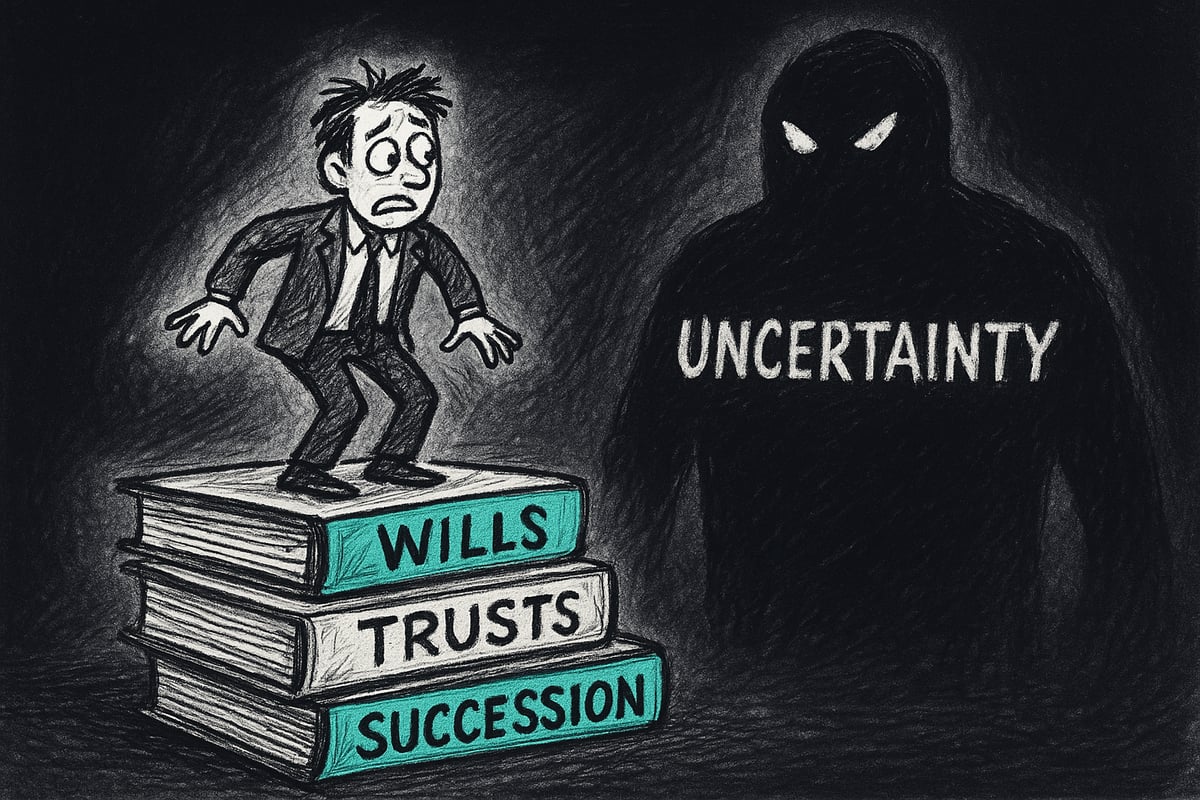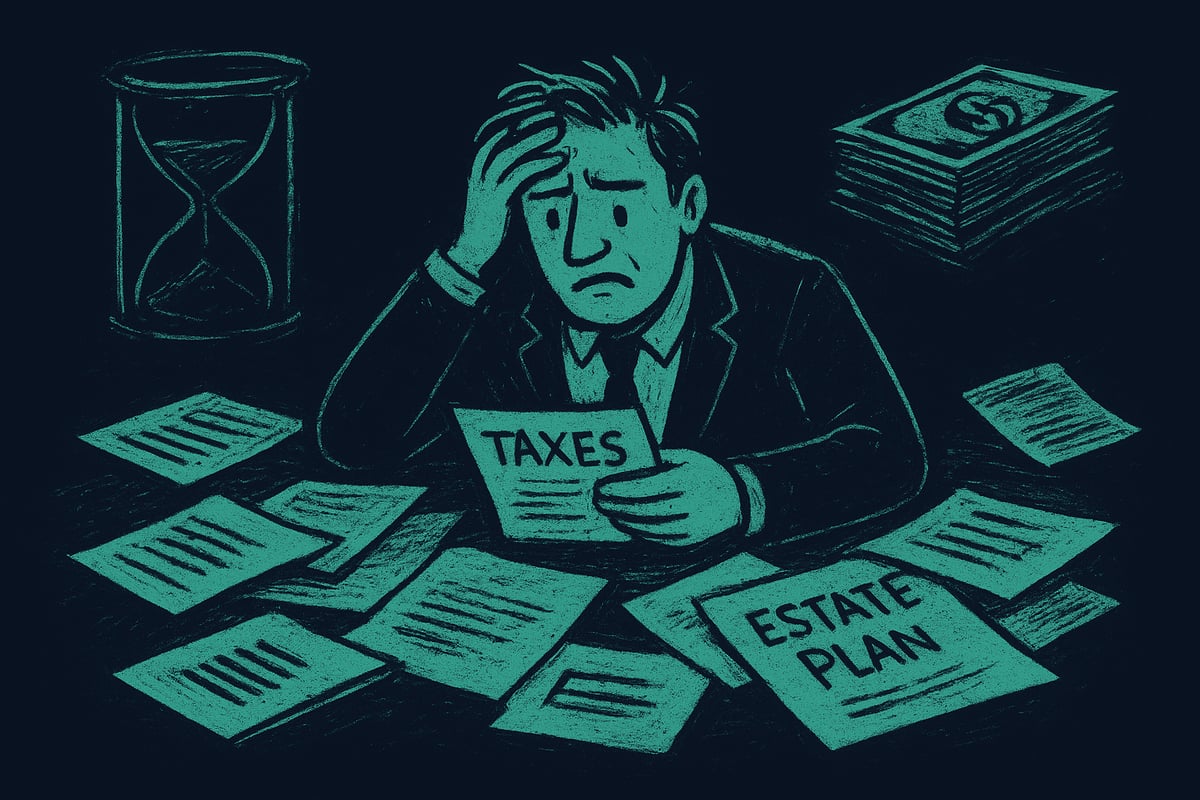Estate Planning For Business Owners Guide 2025

Picture this: you’re out cold, six feet under, and your business is left gasping for air because you never bothered with estate planning for business owners. Sounds dramatic, right? But it’s a real risk too many folks ignore.
Most business owners think they’ll get around to it “someday.” Spoiler: someday is not a calendar date. Without a plan, your family could end up fighting, your employees could be job-hunting, and your legacy could be auctioned off to the highest bidder.
This guide tears the cobwebs off estate planning, making it painfully obvious why you need to act—now, not after your third heart attack. We’ll pull back the curtain on unique business risks, succession drama, tax nightmares, and legal hacks that actually work.
Want your business to outlive you? Stick around. By the end, you’ll know exactly how to keep your empire (and your family) from turning into a cautionary tale.
Why Estate Planning is Critical for Business Owners
Imagine you’re sipping a margarita in the Bahamas, and suddenly, whoops, you choke on a pineapple chunk. Now, what happens to your business? If your answer is “uhh,” you’re not alone. Estate planning for business owners is the adult version of wearing a seatbelt—boring until you need it, then suddenly life-saving. Let’s break down why skipping this is like juggling chainsaws blindfolded.

Unique Risks Facing Business Owners
Let’s face it: for most entrepreneurs, the business is the golden goose and the nest egg. But without estate planning for business owners, that goose might get cooked. When you die (not if, sorry), state laws can slice up your business like a bad Thanksgiving turkey—half to your spouse, half to your kids, and maybe a drumstick to your dog. Family feuds over who gets the CEO mug? Not exactly the legacy you want.
Here’s some cold comfort: only 30% of family businesses make it to the second generation, according to Fidelity. The rest? They vanish faster than your motivation at tax time. The risks are real—forced sales, lawsuits, or your cousin Larry running the company into the ground. Want to see what tools can actually help? Check out these Estate Planning Tools for Small Business Owners for a starter pack that’s more useful than your last New Year’s resolution.
Consequences of Failing to Plan
Let’s play “What’s the Worst That Could Happen?” If your estate planning for business owners is “I’ll get to it someday,” here’s the highlight reel: Probate will grind your business to a halt. The IRS will show up with a bill, but your bank account will have tumbleweeds rolling through it. Your non-working cousin could end up with a controlling stake, and your best employees might bail for less drama.
Worse, your family could be forced to sell the business at a discount just to pay estate taxes. Imagine your life’s work auctioned off like old gym equipment. That’s what happens when you leave things to chance and the probate court.
Benefits of Proactive Estate Planning
Good news—you’re not doomed yet. Proactive estate planning for business owners is like installing a fire extinguisher before the kitchen catches fire. With the right plan, you get to call the shots on who takes over, keep the IRS at bay, and make sure your family isn’t starring in a reality show called “Heir Wars.”
A solid plan means your business keeps running, your heirs get financial security, and your employees don’t panic and jump ship. You can preserve your reputation, minimize taxes, and keep the family peace. Plus, you get to choose your successor, not leave it up to fate or the world’s least-favorite probate judge.
Key Estate Planning Tools for Business Owners
Let’s get real for a second. If you think estate planning for business owners is just about scribbling your name on a will and calling it a day, you’re about as prepared as a goldfish in a blender. The right tools don’t just keep your nosy in-laws out of your business, they keep your company alive when you’re not. Here’s your crash course in not screwing up your legacy.

Wills and Trusts: Foundation of Your Plan
First things first, the will. It’s your last chance to tell everyone where your stuff goes, including the business you’ve sweat over. But if you stop at a will, your heirs could be waiting in probate limbo while the business withers. Trusts, on the other hand, are like the Swiss Army knife of estate planning for business owners. They hold assets, control who gets what, and skip the probate circus.
There are flavors for every palate: revocable living trusts (flexible, changeable), irrevocable trusts (set in stone, tax-friendly), and even business-specific trusts. Picture this: your business stays in trust, your spouse gets income, and a pro manager actually keeps things running. Studies show trust-held businesses face less drama after the owner’s cameo ends.
If you want to skip the lawyer drama, check out Top 6 Estate Planning Software 2025: Features & Tools for digital options that make getting started less painful.
Buy-Sell Agreements and Business Succession
Buy-sell agreements are basically prenups for your business. They spell out exactly what happens to your share if you take the eternal coffee break. There are options: cross-purchase (co-owners buy you out), entity-purchase (company buys your share), or hybrid (mix and match).
Funding these with life insurance or cold hard cash means your business doesn’t have to do a yard sale to pay your heirs. With solid estate planning for business owners, you can make sure your cousin, who thinks Instagram is a business model, never gets a vote. Imagine your co-owner buys your share, the business keeps humming, and nobody’s fighting over the stapler.
Quick Compare Table: Buy-Sell Agreement Types
| Type | Who Buys? | Best For |
|---|---|---|
| Cross-Purchase | Co-Owners | Small partnerships |
| Entity-Purchase | The Business | Larger companies |
| Hybrid | Both | Flexible, complex situations |
Life Insurance and Irrevocable Life Insurance Trusts (ILITs)
Life insurance isn’t just for people who want to make their ex jealous. In estate planning for business owners, it’s a lifeline. The payout covers estate taxes or buys out your heirs, so the business isn’t sold off at a garage sale price.
Put the policy in an Irrevocable Life Insurance Trust (ILIT), and the payout skips your taxable estate. Translation: more cash for your heirs, less for the IRS. An ILIT can fund your buy-sell agreement, making sure your business doesn’t have to sell the company car to pay Uncle Sam.
Advanced Strategies: GRATs, GRUTs, and Family Limited Partnerships
Ready to level up? Grantor Retained Annuity Trusts (GRATs) and Grantor Retained Unitrusts (GRUTs) let you transfer future business growth out of your estate, keeping taxes lower than your expectations for reality TV. Family Limited Partnerships (FLPs) or LLCs help you move business interests to family members, often at a discount, while you keep control.
These advanced tools in estate planning for business owners aren’t for amateurs. High-growth businesses can save a fortune, but get expert help or risk turning your legacy into a cautionary tale.
Step-by-Step Guide to Creating an Estate Plan for Your Business
Congratulations! You’ve finally accepted your own mortality. Now, let’s make sure your business doesn’t die with you. Grab a pen, your ego, and a healthy fear of probate court—let’s walk through estate planning for business owners, one responsible step at a time.

Step 1: Inventory and Valuation of Business Assets
Let’s start by actually figuring out what you own. Sounds basic, but you’d be shocked how many business owners can’t list their assets without checking their email, bank accounts, and that mysterious locked filing cabinet.
- List every business interest, intellectual property, and asset.
- Get a professional valuation—no, your cousin Larry’s guess doesn’t count.
- Use this number to estimate your potential estate tax exposure.
Estate planning for business owners is like prepping for a surprise audit by the Grim Reaper. The more accurate your inventory, the less likely your heirs will have to sell your company just to pay taxes.
Step 2: Define Your Goals and Successor(s)
Ask yourself: Do you want your business to stay in the family, or do you prefer it gets sold to the highest bidder? Maybe you trust your kids, or maybe you’ve seen their TikTok accounts and know better.
- Decide if you want to keep the business in the family, sell it, or bring in professional management.
- Identify your successor(s)—could be a family member, key employee, or someone with actual business sense.
- Set up training and mentorship for your chosen successor.
Estate planning for business owners is about picking a champion before the final bell. If you don’t, the state might hand the business to your least favorite child just to spite you.
Step 3: Draft or Update Legal Documents
Here’s where most people drop the ball. Your will from 2003 won’t cut it. Draft or update your will, trusts, and buy-sell agreements so nobody gets left out (unless you want them to). Align business documents with your personal estate plan to avoid drama.
- Use Top Online Will-Making Platforms in 2025 to simplify document creation, but don’t skip the lawyer if your business is more than a lemonade stand.
- Double-check that all beneficiary designations are coordinated.
Estate planning for business owners requires actual paperwork, not just good intentions. If you ignore this, your ex might end up with your business and your PlayStation.
Step 4: Implement Tax and Liquidity Strategies
Here comes the IRS, ready to take a bite. Set up life insurance, trusts, and gifting strategies to minimize taxes and ensure there’s enough cash to pay what’s owed—without selling off the company’s best assets at a discount.
- Calculate your potential estate tax bill.
- Use ILITs, life insurance, and gifting to keep Uncle Sam at bay.
- Make sure there’s enough liquidity to pay taxes and expenses.
Estate planning for business owners is like setting up a fire escape: you hope you never need it, but if you do, you’ll be glad it’s there.
Step 5: Communicate and Review Regularly
Don’t let your plan gather dust next to your old BlackBerry. Share it with your family, successors, and advisors. Review it after major life changes—births, deaths, business booms, or busts. Schedule annual check-ins to keep everything up to date and compliant.
If you keep your plan a secret, expect your heirs to fight like contestants on a bad reality show. Regular updates and honest conversations save everyone from surprises—except the one where you’re gone.
Navigating Tax Implications and Probate
Facing your own mortality is fun, right? Well, neither are taxes, but failing to plan for them is the business owner’s equivalent of playing Russian roulette with your legacy. Let’s tear off the Band-Aid and get into the real tax and probate headaches lurking in the shadows of estate planning for business owners.

Estate and Gift Taxes for Business Owners
Let’s talk about the vulture circling overhead: estate and gift taxes. In 2025, the federal estate tax exemption is in flux, and if you think Congress won’t change it just to spite you, think again. Some states pile on with their own estate or inheritance taxes, so your business could get double-dipped faster than chips at a bad party.
Here’s the kicker: gifting shares of your business to family during your lifetime can shrink your taxable estate. But do it wrong, and you’ll trigger gift taxes, IRS audits, and maybe a family feud worthy of reality TV. Only 30% of family businesses survive to Gen 2. Coincidence? Nope. Estate planning for business owners means understanding these landmines before you step on them.
Avoiding Probate and Ensuring Business Continuity
Probate: the legal black hole where business dreams go to die. When your estate hits probate, your business could be stuck in limbo, waiting for court approval while your employees update their résumés. Not exactly the legacy you imagined.
Trusts and business entities are your get-out-of-jail-free cards. If you park your business in a trust, it can pass straight to your chosen successor, no court drama required. Imagine skipping the probate parade and keeping your operation humming. That’s the magic of estate planning for business owners: you actually control who’s in charge when you’re not around.
Liquidity Planning: Funding Taxes and Expenses
Here’s a cruel joke: you die, and Uncle Sam hands your heirs a tax bill bigger than your business’s checking account. Without liquidity, your family might have to sell the company at a fire-sale price, just to pay the IRS. Ouch.
Liquidity planning means lining up cash—through life insurance, business reserves, or assets ready to liquidate—so your heirs aren’t forced to auction off your legacy. Smart business owners use tools like Top Exit Planning Tools for Small Business Owners in 2025 to model tax scenarios and optimize liquidity. Bottom line? Estate planning for business owners is about making sure your family inherits a thriving business, not a tax nightmare.
Succession Planning: Ensuring a Smooth Transition
What could possibly go wrong if you just ignore succession planning? Oh, just family fistfights in the parking lot, a business fire sale, and your legacy flushed down the drain. Welcome to the part of estate planning for business owners where we save your company from becoming a cautionary tale.
Developing a Succession Plan
First things first: you need a plan that doesn’t involve a coin toss or a family cage match. Estate planning for business owners starts with mapping out who will take over—family, trusted employees, or that one cousin who still thinks TikTok is a stock market.
Here’s how to do it:
- Identify potential successors. (Hint: Pick someone who actually wants the job.)
- Set up a training and mentorship process.
- Use outside advisors or a professional board for objectivity, not just Aunt Linda’s opinion.
A documented plan means fewer surprises and less drama when you’re not around. For a deep dive on succession, Fidelity’s guide is worth a glance. Remember, estate planning for business owners isn’t just about picking a successor. It’s about keeping the ship afloat.
Timing and Methods of Transfer
So, should you hand over the business now, or leave it as a surprise in your will? If you love chaos, wing it. If you value your sanity (and your business), consider the options.
Compare the methods:
| Transfer Method | Lifetime | At Death |
|---|---|---|
| Tax Impact | Often lower | Potentially higher |
| Control | Can phase out | Successor takes all |
| Family Dynamics | Gradual handoff | Sudden change |
Selling, gifting, or a mix—each has pros and cons. Timing matters for tax perks and a smooth handoff. Estate planning for business owners means you choose when and how the baton gets passed, not the probate court.
Retaining Key Employees and Protecting Business Value
You’ve picked a successor, but what about the loyal staff who actually run the place? Ignore them and your business could lose its soul faster than you can say “exit strategy.” Estate planning for business owners must include plans to keep key employees motivated, not updating their resumes.
Consider:
- Equity incentives or phantom stock
- Stay bonuses for sticking through the transition
- Non-compete and confidentiality agreements
A smooth transition keeps your business valuable and your team loyal. Don’t let your legacy unravel because you forgot the people who made it possible.
Common Pitfalls and How to Avoid Them
Let’s be honest, most people treat estate planning for business owners like flossing: they know it’s important, but it only happens after a scare or a stern lecture. Here’s your wake-up call, minus the dental guilt. If you want your business to survive you, avoid these classic blunders.
1. Failing to Coordinate Personal and Business Estate Plans
Why have just one mess when you can have two? Many skip aligning their personal and business documents, creating loopholes big enough for a probate judge to drive through. This mistake in estate planning for business owners can lead to contradictory instructions, legal drama, and more paperwork than your worst tax season.
2. Outdated Documents or Missing Agreements
Still rocking that buy-sell agreement from 2002? Or worse, you don’t have one? Outdated or missing documents make it easier for your business to implode than a reality show reunion. Remember, estate planning for business owners is a living process. Update your documents before your business becomes a cautionary tale.
3. Ignoring State Laws and Tax Rules
State tax codes change more often than your favorite streaming service hikes prices. Ignore them, and your estate could get eaten alive by taxes or split in ways you never intended. This is one of the most expensive mistakes in estate planning for business owners. Consult an expert, not your cousin who “knows a guy.”
4. Overlooking Liquidity Needs
Picture this: Your heirs inherit your business, but the IRS wants cash—now. Without liquidity, they might be forced to sell your business for pennies just to pay taxes. Don’t let your legacy go on clearance.
5. Not Communicating the Plan
If your family finds out about your plan for the first time at the reading of your will, prepare for a drama worthy of daytime TV. Lack of communication means confusion, resentment, or worse—a court battle. Only 17% of small business owners have a formal succession plan, according to ACTEC, so congratulations if you’re even reading this.
| Pitfall | Disaster Potential | Quick Fix |
|---|---|---|
| Uncoordinated plans | Conflicting outcomes | Align all legal docs |
| Outdated/missing agreements | Business chaos | Review annually |
| Ignoring local laws/taxes | Surprise liabilities | Get pro advice |
| No liquidity for taxes | Forced asset sales | Use life insurance, reserves |
| No communication | Family feuds | Hold a family meeting |
Don’t be that cautionary tale. Regular reviews and updates are the only way to keep your estate planning for business owners from becoming your family’s worst group project. Start planning, start talking, and maybe—just maybe—your business will outlive your questionable taste in office art.
Look, nobody wants to think about someday getting hit by a falling piano, but your business (and everyone you care about) deserves better than a courtroom brawl over your life’s work. You’ve read the guide, you know the odds—most business empires don’t survive the first generation, and probate is basically a game show where losers get your stuff. But hey, you can fix that in less time than it takes to binge an episode. Make your death the least dramatic thing about your legacy. Ready to actually adult and lock in your wishes? Start My Will Now
Related Articles You Should Read
What Happens If You Die Without a Will in Tennessee: 2026 Complete Guide
What Happens If You Die Without a Will in Tennessee: 2026 Complete Guide Meta Description: Dying without a will in Te...
What Happens If You Die Without a Will in Pennsylvania: 2026 Guide
What Happens If You Die Without a Will in Pennsylvania: 2026 Guide Meta Description: Die without a will in Pennsylvan...
What Happens If You Die Without a Will in New York: 2026 Complete Guide
What Happens If You Die Without a Will in New York: 2026 Complete Guide Meta Description: Die without a will in New Y...